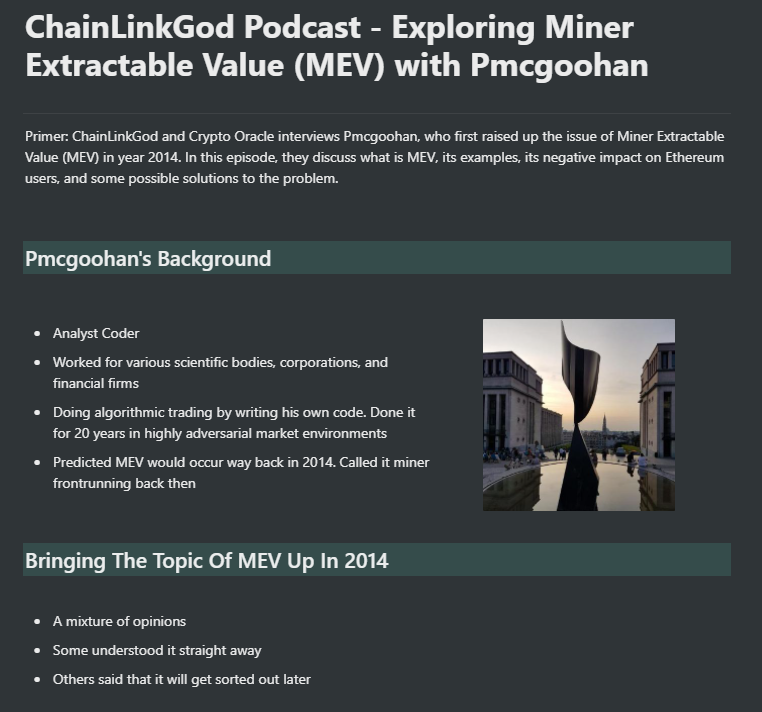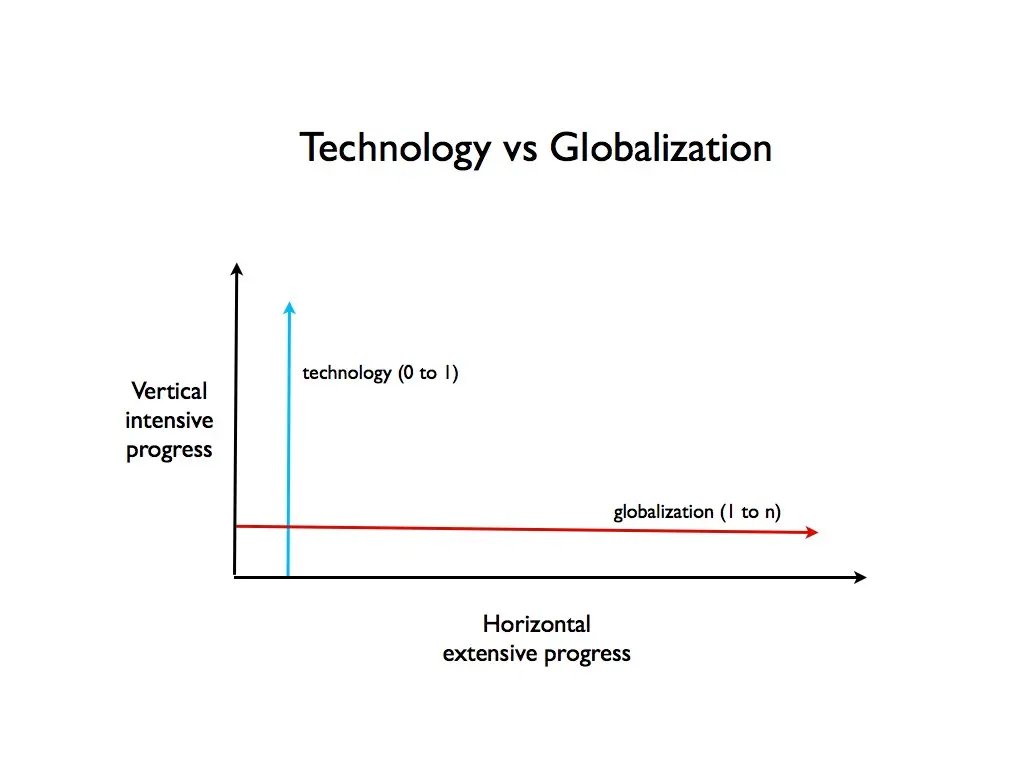@pmcgoohanCrypto discovered Miner Extractable Value (MEV) in 2014. In this episode of the ChainLinkGod podcast, @ChainLinkGod and @Crypto___Oracle discusses with P Mcgoohan what is MEV, its implications, and possible solutions for it.
Read on 👇
Read on 👇
@pmcgoohanCrypto @ChainLinkGod @Crypto___Oracle 1/ P Mcgoohan is an analyst coder. He has been doing algorithmic trading for the past 20 years 📈📈
In 2014, he brought up the topic of MEV (called it "miner frontrunning" back then):
🔹Some understood it straightaway💡
🔹Others said it will get sorted out later 🕛🕒🕕🕘
#mev
In 2014, he brought up the topic of MEV (called it "miner frontrunning" back then):
🔹Some understood it straightaway💡
🔹Others said it will get sorted out later 🕛🕒🕕🕘
#mev

@pmcgoohanCrypto @ChainLinkGod @Crypto___Oracle 2/ He knew that MEV will become an issue
🚨Ethereum block creation was borrowed from Bitcoin
🚨For Bitcoin, transaction order does not matter as people are not accessing a shared resource
🚨In Ethereum, people are competing to use shared resources
🚨Ethereum block creation was borrowed from Bitcoin
🚨For Bitcoin, transaction order does not matter as people are not accessing a shared resource
🚨In Ethereum, people are competing to use shared resources

@pmcgoohanCrypto @ChainLinkGod @Crypto___Oracle 3/ There are many misconceptions as to what MEV entails. P Mcgoohan formally defines what MEV is and isn't 🧠
He also provides examples of MEV
🔹Frontrunning 🏃
🔹Sandwich Attacks🥪
🔹Arbitrage
🔹Liquidations🌊
He also provides examples of MEV
🔹Frontrunning 🏃
🔹Sandwich Attacks🥪
🔹Arbitrage
🔹Liquidations🌊

@pmcgoohanCrypto @ChainLinkGod @Crypto___Oracle 4/ Why is Arbitrage a MEV?
Because arbitrage is done as a form of MEV at the moment
Because arbitrage is done as a form of MEV at the moment

@pmcgoohanCrypto @ChainLinkGod @Crypto___Oracle 5/ Are there good forms 😇 and bad forms 👿 of MEV?
No. There are only bad forms 👿
🚨MEV reduces market efficiency and users are forced to overpay
🚨Some argue that latency arbitrage is a good form of MEV. However, it does not exist in Ethereum
No. There are only bad forms 👿
🚨MEV reduces market efficiency and users are forced to overpay
🚨Some argue that latency arbitrage is a good form of MEV. However, it does not exist in Ethereum

@pmcgoohanCrypto @ChainLinkGod @Crypto___Oracle 6/ "Miners are in control of time on Ethereum. They warp time to their advantage. It's a way that you can put it they control time, they're time lords." - P Mcgoohan
@pmcgoohanCrypto @ChainLinkGod @Crypto___Oracle 7/ MEV impacts the long-term success of Ethereum
🚨If Ethereum is globally adopted, MEV would cost $2 trillion per annum
🚨As Ethereum use cases expands, the attack vectors increases
🚨If Ethereum is globally adopted, MEV would cost $2 trillion per annum
🚨As Ethereum use cases expands, the attack vectors increases

@pmcgoohanCrypto @ChainLinkGod @Crypto___Oracle 8/ At the last critical millisecond of block creation, the network gives 1️⃣ miner the power to choose transactions for that block. At that exact point, Ethereum is centralized
He proposes batching together transactions and ordering it by time to ensure fair ordering👍👍👍
He proposes batching together transactions and ordering it by time to ensure fair ordering👍👍👍

@pmcgoohanCrypto @ChainLinkGod @Crypto___Oracle 9/ He shares with us some thoughts on MEV and Layer 2s, Oracle Networks, and EIP-1559
#EIP1559
#EIP1559

@pmcgoohanCrypto @ChainLinkGod @Crypto___Oracle 10/ There is a fatalistic response among the community that MEV is inevitable and there's nothing that can be done about it 😩
P Mcgoohan exhorts listeners to believe in our devs. It will eventually be solved by the galaxy brains in the space 💪💪💪🧠🧠🧠
P Mcgoohan exhorts listeners to believe in our devs. It will eventually be solved by the galaxy brains in the space 💪💪💪🧠🧠🧠

@pmcgoohanCrypto @ChainLinkGod @Crypto___Oracle For the full podcast: open.spotify.com/episode/6pqAXg…
For the full article on substack: thereadingape.substack.com/p/chainlinkgod…
Thanks to @ChainLinkGod and @Crypto___Oracle for this episode! It is very informative!
For the full article on substack: thereadingape.substack.com/p/chainlinkgod…
Thanks to @ChainLinkGod and @Crypto___Oracle for this episode! It is very informative!
@pmcgoohanCrypto @ChainLinkGod @Crypto___Oracle Like our work?
✅Follow us
✅Subscribe to our substack
Apes alone weak 🦍💀
Apes together strong🦍🦍🦍💪💪💪
Stay strong, apes 🦍💪
~ End Thread
✅Follow us
✅Subscribe to our substack
Apes alone weak 🦍💀
Apes together strong🦍🦍🦍💪💪💪
Stay strong, apes 🦍💪
~ End Thread
• • •
Missing some Tweet in this thread? You can try to
force a refresh











